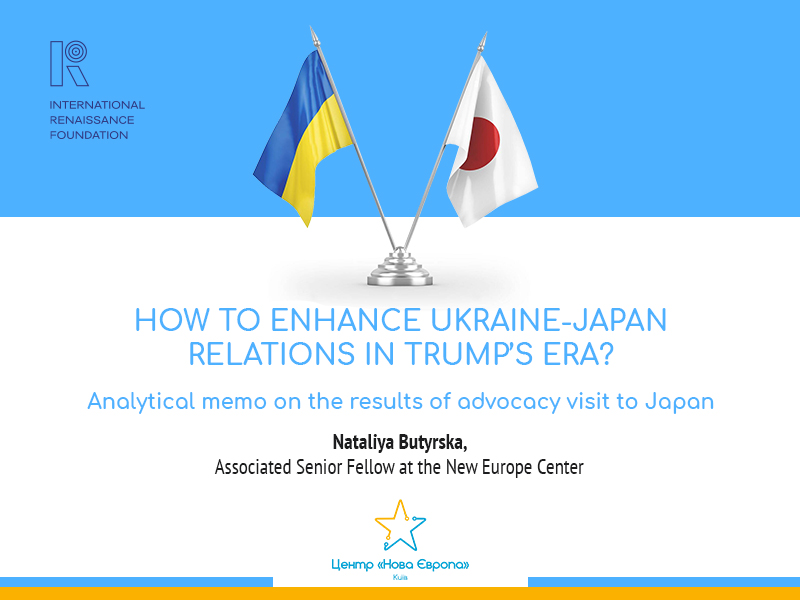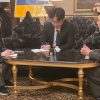
Nataliya Butyrska, Associated Senior Fellow at the New Europe Center
For more than three years after Russia’s full-scale invasion, Japan demonstrates unwavering support for Ukraine.
In his virtual speech at the Leaders’ Summit on the third anniversary of Russia’s invasion of Ukraine on 24 February 2025, Prime Minister Shigeru Ishiba reaffirmed that Japan’s position in support of Ukraine will remain “firm and unwavering.” He noted that Japan is determined to walk hand in hand with Ukraine until “peace returns to the beautiful Ukrainian land.” During the meeting of G7 foreign ministers on the sidelines of the Munich Security Conference, Japanese Foreign Minister Takeshi Iwai reaffirmed the importance of achieving a just and lasting peace and his determination to continue to assist Ukraine, in particular to support rehabilitation and reconstruction in the medium and long term. Other Japanese officials from the Ministry of Foreign Affairs, the Ministry of Defence, the Prime Minister’s security team, and representatives of leading think tanks reiterated the same position during the New Europe Center’s advocacy visit to Japan on 17-22 February 2025.
On 3 March 2022, the country provided Ukraine with financial, humanitarian and other assistance totalling more than $12.1 billion, becoming one of the country’s largest donors. In 2024 alone, Tokyo allocated $4.2 billion to support Ukraine’s budget. At the same time, Japan provides assistance to Ukraine through the Japan International Cooperation Agency (JICA). The amount of support has reached more than $1.5 billion. During the meeting in Tokyo, a meaningful discussion was held with the leadership of the JICA office on how the organisation could increase its assistance to Ukraine, particularly in the energy sector, given the termination of funding from the USAID.
At the same time, there is still a strong prejudice in Japan against providing military assistance to Ukraine, based on the Three Principles of Arms Exports, on the one hand, and pacifist sentiments that are deeply rooted in Japanese society, on the other. Despite the fact that public opinion on the need to continue supporting Ukraine for three years remains at 70 per cent, this does not include military assistance.
On 13 June 2024, Ukraine and Japan signed the Accord on Support for Ukraine and Cooperation between Ukraine and the Government of Japan. It was the first security agreement concluded by Kyiv in accordance with the G7 Joint Declaration with a non-NATO state and a state in the Asia-Pacific region. For Japan itself, this type of agreement and level of support is unprecedented. It outlines broad areas of cooperation between Kyiv and Tokyo, including security and defence, humanitarian assistance, energy sector support, demining, recovery and reconstruction. This agreement serves as a basis for comprehensive cooperation between the two countries. There are cautious hopes for greater Japanese involvement in supporting Ukraine in the area of air defence, given previous efforts, including the allocation of $37 million to a NATO Trust Fund to provide drone detection systems in Ukraine, and the provision of vehicles for the Ukrainian Armed Forces, including trucks and dump trucks.
As a member of the G7, Japan plays an important role in shaping the general policy of the world’s developed economies to support Ukraine and put pressure on Russia over its military aggression, in particular through the application of tough economic sanctions, export restrictions and international isolation. The government of Japan, represented by the previous Prime Minister Fumio Kishida, has invested considerable political and diplomatic capital to unite the efforts of not only the G7 countries, but also the leading states of the so-called Global South, to strengthen international support for Ukraine during its presidency in 2023.
The current Prime Minister Shigeru Ishiba has confirmed the continuation of his predecessor’s course within the G7. However, Donald Trump’s statements about negotiations with Russia to end the war against Ukraine, as well as talks about the possibility of lifting sanctions and concluding major economic agreements between the two countries (without preconditions for the return of the Ukrainian occupied territories and the restoration of Ukraine’s sovereignty and territorial integrity), on the one hand, undermine the coordinated policy of the G7 countries to support a just and lasting peace in Ukraine, and on the other hand, send premature signals to many Western companies about the possibility of returning to business with Russia, which continues its aggression against Ukraine.
The altercation between Volodymyr Zelenskyy and Donald Trump during their meeting in Washington caused concern in Tokyo. Prime Minister Shigeru Ishiba stressed that Japan should do everything possible to prevent a split between the United States, Ukraine, and the G7 countries.
Donald Trump’s desire for a quick peace that involves concessions from Ukraine undermines the principles of international law and sets a precedent for changing the status quo by force. This raises serious concerns in Japan, which is clearly aware of the danger of the dominance of the principle of force over the rule of international law in the light of threats in the Indo-Pacific region. During the meetings in Tokyo, it was repeatedly stated that a sustainable and lasting peace in Ukraine is also important from the point of view of Japan’s interests, otherwise it would send the wrong signal to China. There is also serious concern in Japan about the DPRK’s involvement in a war against Ukraine, particularly with regard to the implications for regional and global security.
The US assurances of its unwavering commitment to Japan’s defence, including the use of the full range of capabilities, including nuclear weapons, which were voiced during Shigeru Ishiba’s visit to Washington, on the one hand, give confidence in political and public circles that Washington continues to be a reliable guarantor of the country’s security. On the other hand, the decline of allied relations and alliances, as well as changes in US foreign policy, including pressure on allies and statements about a possible withdrawal from security commitments in Europe, raise concerns about Japan’s security and economic future.
Ukraine and Japan maintain close relations that have been tested by time and war. However, Donald Trump’s presidency and the US administration’s changing approaches to international politics, in particular, the peaceful settlement of the Russian-Ukrainian war and the resumption of dialogue between the US and Russia, may put the Japanese government in a difficult situation where it will have to balance its policy towards the US and its allies, given its own economic vulnerabilities and dependence on Washington for security.
In these circumstances, Japan and other Western countries face an extremely difficult task: on the one hand, to maintain unity and find a way to jointly resist the onslaught of Trump and his administration, which is causing enormous damage to the position of the United States and the world as a whole, and on the other hand, to support Ukraine’s struggle against Russian aggression in achieving a just peace for Ukraine as a guarantee of preserving the international rules-based order, which is being actively destroyed by Russia together with its allies – Iran, North Korea and China. In this regard, it is important (and this was emphasised during the advocacy visit to Tokyo) that:
First, Japan and other G7 countries should prevent the lifting of sanctions against Russia, until the occupied Ukrainian territories will be liberated. Also, Russia should not be allowed into G7 (Donald Trump expressed such possibility) as a country that destroyed fundamental principles, on which G7 was built.
Second, in the situation of a possible decline of American support, Ukraine requires Japan’s continued involvement in maintaining the stable functioning of its economy and energy sustainability, as well as providing non-lethal equipment, equipment for the reconstruction and protection of civilians (including utility vehicles), increasing opportunities for treatment and rehabilitation of wounded military personnel, etc.
Third, in view of the opening of an independent mission from the Embassy of Japan in Belgium and in order to strengthen security cooperation between the Indo-Pacific region and the Euro-Atlantic area, Japan and Ukraine should work to expand cooperation within the Japan-Ukraine-NATO triangle.
Fourth, Ukraine and Japan should work more closely to counter Russia-North Korea military cooperation, in particular with regard to sanctions and export controls on Western-made dual-use goods that are freely available to the Russian Federation and the DPRK and are used in the manufacture of weapons.
Fifth, in the context of the suspension of the USAID programme, Japan may consider expanding the role of JICA to replace American participation in project development, especially in critical areas, such as energy.
Sixth, for Ukraine, the issue of participation in the reconstruction and post-war recovery of partner countries that supported it during the war is fundamental, which is why Japan’s participation is a priority.
Seventh, both sides should continue a joint work on setting up an international compensation mechanism and using frozen Russian assets.
Eighth, for further sustainable support of Ukraine, it is necessary to strengthen cooperation with the economic and financial circles of Japan, in particular through the opening of the Chamber of Commerce in Kyoto and Osaka.
The document was prepared with the support of the International Renaissance Foundation. The document reflects the position of the authors and does not necessarily coincide with the position of the International Renaissance Foundation.







